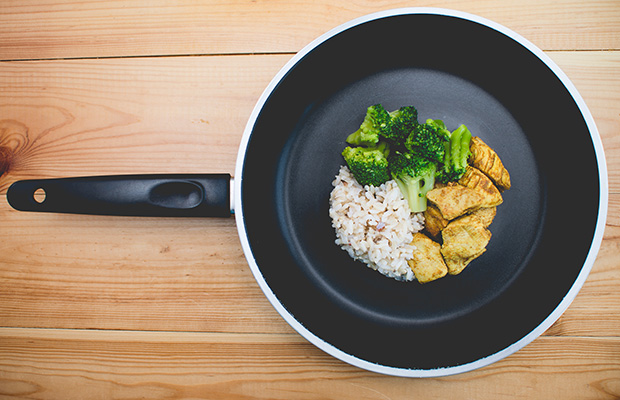
It doesn’t take much more than visiting a CrossFit box or running into a friend who’s sworn off carbs to know that some people take their dietary decisions very much to heart. You can’t exactly blame someone for evangelizing a lifestyle that’s helped them lose weight, gain muscle or have more energy, after all.
“Everybody who is paleo thinks that everybody should eat paleo and that’s the only way to do it. Everybody who does low-carb thinks that’s the only thing everybody should be doing,” says DailyBurn Fitness/Nutrition Coach Kit Coward, RDN, LD, CDE. “But what might work for me might not work for you, based on genetics.”
This idea that foods and diets are good for some people and less effective for others is the backbone of personalized nutrition, a burgeoning approach to eating that suggests general nutrition guidelines should be replaced by more individualized approaches. Could this one-size-does-not-fit-all approach be the diet of the future?
“What you eat is one thing, but how your body can actually digest and absorb and assimilate that is something else.”
Treating Food Like Personalized Medicine
Food is following in the footsteps of personalized medicine, a disease prevention and treatment approach that takes into account differences in people’s genes, environment and lifestyle — and it’s been gaining a lot of traction recently. President Obama launched the Precision Medicine Initiative last January, which is supporting research in the area.
You can call personalized nutrition a spinoff, but nutrition professionals have long known that you can’t just read a nutrition facts label — or follow standard dietary guidelines — and call it a day. (Case in point: The new Dietary Guidelines for Americans was just released, and some leading health experts are pretty peeved about the recommendations.)
RELATED: Are You Exceeding Your Daily Sugar Intake in Just One Meal? [Infographic]
“The Dietary Guidelines is what is out there in general to guide the way people eat and is used for public policy, but it doesn’t necessarily apply to someone on an individual basis to support metabolism or decrease their risk for disease,” says Sonya Angelone, MS, RDN, CLT, a spokesperson for the Academy of Nutrition and Dietetics.
Instead, Angelone relies on blood tests and DNA samples to get a clearer picture of how foods are actually affecting her clients’ bodies from the inside out. “What you eat is one thing, but how your body can actually digest and absorb and assimilate that is something else,” she says.
Recently, a team of researchers in Israel have been studying personalized nutrition and trying to find out why different diets seem to work for some people and not others. As a part of their research, they monitored the blood sugar levels of 800 people after eating, and found that some people’s blood sugar levels spiked way higher than others’ even after eating the same foods. Their findings suggest that the way bodies react to foods might have much more to do with factors such how your body releases insulin, the type of bacteria in your intestines and gut and even genetics.
RELATED: My Food Diary: What This Super-Fit Trainer Eats in a Day

DNA: You Are What You Eat
While this customizable approach might seem complicated, you don’t have to be a scientist to decode your body and create a more optimal diet. Registered dietitians who specialize in personalized nutrition can be great resources for putting the science into action. In her practice, Angelone uses Oxford Biomedical Technologies’ Mediator Release Test for food sensitivity testing; genomic testing from Genomic Solutions Now to learn what nutrient forms your genes need for optimal health; and advanced cholesterol tests from Boston Heart Diagnostics, among others. Unfortunately, these tests need to be administered by a professional and can be pricey, but some are covered by insurance and the insights could very well change the course of your life.
“A lot of these tests give us insight we used to not have before, so we can make very specific recommendations based on that particular person, their lifestyle and their genetic risks,” says Angelone.
For example, if your father and grandfather both had heart attacks, you’re at an increased risk, but it doesn’t mean you’re definitely going to have a heart attack. “If you have a really healthy lifestyle you can stop those genes from expressing themselves and lower your risk for getting those diseases,” she says.
DIY: The Beginner’s Guide to Personalized Nutrition
Personalized nutrition is still very, very new, so you might be hard-pressed to find a registered dietitian in your area who incorporates genetic or other similar testing into her practice. If you can’t, or you’re just not ready to go all Bill Nye on your diet, there are still things you can do to try out the approach for yourself.
Order an at-home kit. Order a kit, wait for it to arrive, then send back a swab and San Francisco-based uBiome will analyze your microbiome for you. You’ll be able to compare your gut bacteria to that of people with various diets and lifestyles, and even yourself over time. The company suggests comparing results before and after a lifestyle change, like a new diet, to see just how well your body is digesting food and synthesizing vitamins under the new diet.
Tune in. While there are a lot of things you can’t feel, like high blood pressure and high cholesterol, checking in with how a diet makes you feel is an important step to figuring out what works for you and what doesn’t, says Angelone. Pay attention to your energy levels, how you’re sleeping, what your appetite is like, or if you’re feeling achy, or like you’re in a fog. If a friend swears a vegan diet changed her life but it makes you feel like crap, don’t force it.“You have to know what’s right for you,” she says.
RELATED: Veganuary: Should You Try a Part-Time Vegan Diet
Don’t be afraid to switch it up. You’ll never know if something works for you unless you try. Ruling out fad diets and starvation diets, there’s no harm in following a diet for six to eight weeks and seeing if you have results, says Coward. At that point, most people will begin to notice a change in weight, energy, or whatever their desired outcome was, so if you aren’t feeling great at that point, consider a new game plan. “Physicians do that with medications all the time,” says Coward. “They’ll prescribe a medication and if they’re not getting the results they want they’ll make a switch.”
